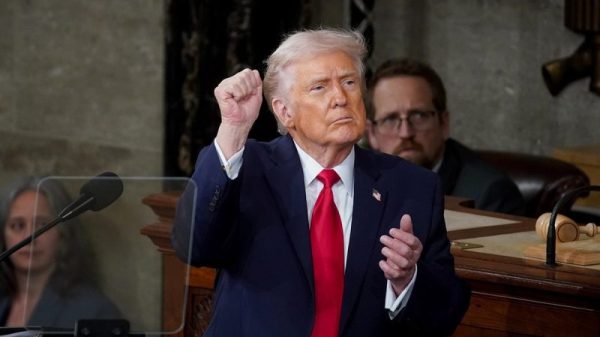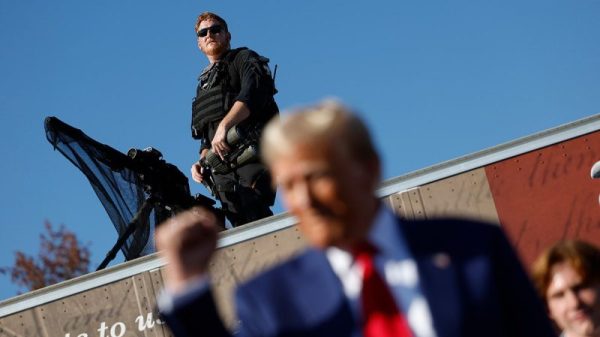Former Arkansas governor Asa Hutchinson’s decision to run a distinctly anti-Trump Republican presidential campaign translated to just 191 votes in the Iowa caucuses Monday, one of the worst showings ever for a politician of some renown. He dropped out of the race. And then the Democratic National Committee took the opportunity to dance on Hutchinson’s political grave.
The DNC issued a brief, sarcastic statement saying, “This news comes as a shock to those of us who could’ve sworn he had already dropped out.”
The statement led to a chorus of criticism from anti-Trump Republicans and even some Democrats. They argued that it was a gratuitous attack on someone who was not only a non-factor in the race but had been saying many of the same things Democrats had about Trump. The White House said Wednesday that President Biden’s chief of staff, Jeff Zients, called Hutchinson to apologize.
But while this is the one that blew up, it wasn’t the only discordant note from a party that has sought to cast Trump and election-denying Republicans as a unique threat to democracy — not even the only one this week. Increasingly, Democrats’ desire to go after the GOP writ large and win elections has clashed with their admonitions that Trump and election denial are singular menaces.
Just hours before Hutchinson’s dismal showing in Iowa, the Biden campaign turned to Illinois Gov. J.B. Pritzker to drive its message ahead of the caucuses there. That message: that the GOP candidates were more or less the same.
“If we’re all being honest about it, there is no difference between the Republican candidates in this field when it comes to what it means for working families and all Americans who want a better life for themselves and for their communities,” Pritzker said at a Biden campaign news conference.
Pritzker made similar arguments in the context of Biden’s focus on democracy. “The anti-freedom, anti-democracy ideas that Donald Trump’s party stands for are the same, whether it’s him or his Mini-Mes spewing it,” Pritzker said.
Pritzker mentioned Nikki Haley’s failure to cite slavery as the cause of the Civil War — something Haley later sought to correct — alongside Trump’s rhetoric about immigrants “poisoning the blood” of the country.
“All of these Republican candidates are singing the same terrible song,” Pritzker said.
The DNC has sought to paint with a broad brush in linking to Trump even Republicans who have criticized him — not necessarily saying they’re the same, but that they fall under the MAGA umbrella. Some, like Haley and former New Jersey governor Chris Christie, worked for Trump but have distanced themselves from him, and they haven’t subscribed to core tenets of the MAGA movement, like election denialism.
The DNC suggested last month that Christie, who like Hutchinson extensively criticized Trump on the campaign trail, was truly a “MAGA Republican” because he had pushed to repeal Obamacare. The GOP’s repeal efforts predated the advent of the MAGA movement. (It also issued a harsh statement when Christie ended his own anti-Trump campaign last week.) Last month, it labeled Haley and New Hampshire Gov. Chris Sununu (R) as “two MAGA extremists.”
The other big flash point came last year, when Democrats caused some consternation in their own ranks by meddling in about a dozen Republican primaries to elevate extreme — and often election-denying — candidates. The aim was to face more beatable opponents in the general election.
And the thing is: It worked. Those candidates won in a half-dozen primaries and went on to lose to Democrats in every one.
But just because the tactic didn’t backfire doesn’t really address the moral side, which is that Democrats promoted and could have helped install the kinds of supposedly dangerous candidates they so warned about. When the effort was forged, 35 prominent Democrats issued a letter calling for an end to the practice, calling it “risky and unethical to promote any candidate whose campaign is based on eroding trust in our elections.” If these candidates are indeed so dangerous, why would you ever help them get one step closer to elected office?
The draw of these tactics is clear. Democrats are in the business of fighting against Republicans and winning elections. So attacking Republicans and promoting more beatable candidates in primaries — a strategy they didn’t invent last cycle — makes sense, as does tying Republicans to an unpopular former president. It’s become clear in recent elections that the candidates most associated with Trump’s brand and style don’t fare particularly well.
The problem is that if pretty much everyone is interchangeable with the man you’ve labeled a unique threat, it diminishes the argument that he’s actually a unique threat.
You can criticize Haley for insufficiently warning of the dangers of Trump and even for flip-flopping on him, just as you can criticize her and the more-Trump-critical Sununu for saying they’d still vote for Trump. Republicans certainly play the game to avoid offending Trump’s many supporters, at the very least, and accordingly align at least somewhat with the MAGA movement.
But the idea that Haley and Sununu — both of whom have garnered relatively positive reviews from independents and even Democrats and did not push his stolen-election crusade — are MAGA extremists akin to Trump would seem to be a pretty tough sell. And the risk is that you look like you’re just saying stuff, even when it comes to Trump.
The Hutchinson example is more head-scratching. Both he and Christie effectively ran sacrificial missions aimed at taking out Trump, which left them politically homeless — largely echoing many of Democrats’ key arguments in the process. The received message is that even that doesn’t earn you much of a pass from the other side.
At least the White House now seems to recognize that this was perhaps counterproductive to the effort to rid the country of Trumpism.
Former Arkansas governor Asa Hutchinson’s decision to run a distinctly anti-Trump Republican presidential campaign translated to just 191 votes in the Iowa caucuses Monday, one of the worst showings ever for a politician of some renown. He dropped out of the race. And then the Democratic National Committee took the opportunity to dance on Hutchinson’s political grave.
The DNC issued a brief, sarcastic statement saying, “This news comes as a shock to those of us who could’ve sworn he had already dropped out.”
The statement led to a chorus of criticism from anti-Trump Republicans and even some Democrats. They argued that it was a gratuitous attack on someone who was not only a non-factor in the race but had been saying many of the same things Democrats had about Trump. The White House said Wednesday that President Biden’s chief of staff, Jeff Zients, called Hutchinson to apologize.
But while this is the one that blew up, it wasn’t the only discordant note from a party that has sought to cast Trump and election-denying Republicans as a unique threat to democracy — not even the only one this week. Increasingly, Democrats’ desire to go after the GOP writ large and win elections has clashed with their admonitions that Trump and election denial are singular menaces.
Just hours before Hutchinson’s dismal showing in Iowa, the Biden campaign turned to Illinois Gov. J.B. Pritzker to drive its message ahead of the caucuses there. That message: that the GOP candidates were more or less the same.
“If we’re all being honest about it, there is no difference between the Republican candidates in this field when it comes to what it means for working families and all Americans who want a better life for themselves and for their communities,” Pritzker said at a Biden campaign news conference.
Pritzker made similar arguments in the context of Biden’s focus on democracy. “The anti-freedom, anti-democracy ideas that Donald Trump’s party stands for are the same, whether it’s him or his Mini-Mes spewing it,” Pritzker said.
Pritzker mentioned Nikki Haley’s failure to cite slavery as the cause of the Civil War — something Haley later sought to correct — alongside Trump’s rhetoric about immigrants “poisoning the blood” of the country.
“All of these Republican candidates are singing the same terrible song,” Pritzker said.
The DNC has sought to paint with a broad brush in linking to Trump even Republicans who have criticized him — not necessarily saying they’re the same, but that they fall under the MAGA umbrella. Some, like Haley and former New Jersey governor Chris Christie, worked for Trump but have distanced themselves from him, and they haven’t subscribed to core tenets of the MAGA movement, like election denialism.
The DNC suggested last month that Christie, who like Hutchinson extensively criticized Trump on the campaign trail, was truly a “MAGA Republican” because he had pushed to repeal Obamacare. The GOP’s repeal efforts predated the advent of the MAGA movement. (It also issued a harsh statement when Christie ended his own anti-Trump campaign last week.) Last month, it labeled Haley and New Hampshire Gov. Chris Sununu (R) as “two MAGA extremists.”
The other big flash point came last year, when Democrats caused some consternation in their own ranks by meddling in about a dozen Republican primaries to elevate extreme — and often election-denying — candidates. The aim was to face more beatable opponents in the general election.
And the thing is: It worked. Those candidates won in a half-dozen primaries and went on to lose to Democrats in every one.
But just because the tactic didn’t backfire doesn’t really address the moral side, which is that Democrats promoted and could have helped install the kinds of supposedly dangerous candidates they so warned about. When the effort was forged, 35 prominent Democrats issued a letter calling for an end to the practice, calling it “risky and unethical to promote any candidate whose campaign is based on eroding trust in our elections.” If these candidates are indeed so dangerous, why would you ever help them get one step closer to elected office?
The draw of these tactics is clear. Democrats are in the business of fighting against Republicans and winning elections. So attacking Republicans and promoting more beatable candidates in primaries — a strategy they didn’t invent last cycle — makes sense, as does tying Republicans to an unpopular former president. It’s become clear in recent elections that the candidates most associated with Trump’s brand and style don’t fare particularly well.
The problem is that if pretty much everyone is interchangeable with the man you’ve labeled a unique threat, it diminishes the argument that he’s actually a unique threat.
You can criticize Haley for insufficiently warning of the dangers of Trump and even for flip-flopping on him, just as you can criticize her and the more-Trump-critical Sununu for saying they’d still vote for Trump. Republicans certainly play the game to avoid offending Trump’s many supporters, at the very least, and accordingly align at least somewhat with the MAGA movement.
But the idea that Haley and Sununu — both of whom have garnered relatively positive reviews from independents and even Democrats and did not push his stolen-election crusade — are MAGA extremists akin to Trump would seem to be a pretty tough sell. And the risk is that you look like you’re just saying stuff, even when it comes to Trump.
The Hutchinson example is more head-scratching. Both he and Christie effectively ran sacrificial missions aimed at taking out Trump, which left them politically homeless — largely echoing many of Democrats’ key arguments in the process. The received message is that even that doesn’t earn you much of a pass from the other side.
At least the White House now seems to recognize that this was perhaps counterproductive to the effort to rid the country of Trumpism.





















